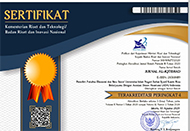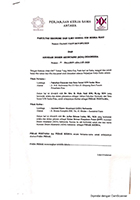Author Guidelines
This journal accepts articles in the fields of economics, banking, finance, both conventional and sharia. Articles can be in the form of research results, literature studies both qualitative and quantitative. All articles are written in good and correct Indonesian.
1. General Writing Guidelines
All articles/manuscripts must be uploaded to Editorial Al-Iqtishad on Online Submission at the E-Journal portal address: http://ejournal.uin-suska.ac.id/index.php/iqtishad/user/register, where the author registers as Authors/authors online. If the author has problems submitting online, please contact the journal admin at the following email: aliqtishad@uin-suska.ac.id or email (ilham.c.putra@uin-suska.ac.id / WA 0877 9355 1327)
2. Article/Manuscript Templates
Articles/manuscripts must comply with the writing guidelines below or be based on an article template.
3. Review Articles/Manuscripts
Each submitted article will be reviewed by two reviewers. Decisions for publication, revision, or rejection are based on the reviewer's report/recommendation. If the reviewer states that the article is not suitable for publication in this journal, it will be rejected. Decisions will be sent to authors within three months of the submission date.
4. Revision of Articles/Manuscripts
Articles/manuscripts with revision notes from the reviewers will be sent back to the authors and the authors will immediately make improvements/revisions and send them again to the editor via the Online Submission Interface (http://ejournal.uin-suska.ac.id/index.php/al -iqtishad/index). Revised manuscripts returned more than three months later will be considered as new submissions.
5. Editorial Office of Al-Iqtishad Journal
Editorial Office of Al-Iqtishad Journal. Faculty of Economics and Social Sciences
State Islamic University (UIN) Sultan Syarif Kasim Riau, Jalan H. R. Soebrantas KM. 15.5, Simpangbaru, Handsome,
Pekanbaru - 28293, Email: aliqtishad@uin-suska.ac.id or email: ilham.c.putra@uin-suska.ac.id / WA 0877 9355 1327
6. Guidelines for Uploading Articles Online
Authors who already have an account can directly login to OJS. If the author does not have an account, he must register as an author through the following address: http://ejournal.uin-suska.ac.id/index.php/iqtishad/user/register
Authors must fill out the form as detailed as possible, especially those marked with an asterisk (*) on the form must be filled in. After all textbox forms are filled in, the author clicks the "Register" button to continue registration. Next, the author enters the section for submitting/uploading articles online by clicking "New Submission". In the Start a New Submission section, click 'Click Here'. Then follow step of the five steps of the upload process, namely:
Step 1: Starting Submission: Select the articles to be uploaded, which can be in the form of research results or literature reviews.
Step 2: Uploading Submissions: To upload articles/manuscripts to this journal, click Browse on the Upload submission file item and select the article/manuscript file, then click the Upload button.
Step 3: Entering Metadata: In this step, the author metadata details must be entered. After that, the title of the manuscript and abstract must be uploaded by copying the text and pasting it in the textbox including the keywords.
Step 4: Uploading Additional Files: Additional files must be uploaded including the Covering / Submission Letter, and the Signed Copyright Transfer Agreement Form. By clicking the Browse button, selecting a file, then clicking the Upload button.
Step 5: Confirming Submission: The author must check the uploaded article/manuscript document. After checking that the documents are correct, click the Finish Submission button. Then the author or the author's main contact (correspondent author) will receive notification via email and can see the progress of the editorial process of the article on OJS.
7. Author Fee (Page Charge)
Al-Iqtishad Journal is an open access national journal. Since submitting the manuscript in 2013 the author has not paid (free) for the costs of submitting articles and publishing articles.
Readers can read and download full text articles for free.
8. User Rights
All articles published in Open Access will be immediately and permanently free for everyone to read and download.
9. Manuscript Preparation Guide
9.1. Articles/scripts are the result of research or literature studies in economics, finance or banking, both conventional and sharia.
9.2. After the publication of the manuscript, the author must provide a letter stating that the manuscript has never been or is being considered for publication in another journal.
9.3. Manuscript structure
Title. The title must be informative, straightforward and reflect the content of the article. The maximum length of the title is 16 words. Every letter in the title is capitalized.
Name of author and institution. The author's name must be accompanied by the author's institution/affiliation and email address, without an academic degree and/or position.
Abstract. Abstract consists of 150-200 words, contains a clear statement of research objectives, methods, results, and research implications, without citing references. Keywords maximum 5 words/phrase.
Introduction. This introduction explains the background of the problem, research objectives and benefits, research gaps, novelty, and research urgency.
Literature Review. This section describes the theory cited, previous research, hypothesis development (if any), and hypotheses (if any).
Method. This section describes the type of research, population and sample (for quantitative), research subjects (for qualitative), data collection techniques, research operational variables and data analysis techniques.
Results and Discussion. This section describes the results of the research and discussion analysis. Data is presented in the form of tables or figures whenever possible. The discussion is described clearly and concisely. The discussion shows the relevance between the results and the hypothesis, and compares the results with previous research.
Conclusion. This section answers the research objectives and provides research implications and limitations as well as suggestions.
Bibliography. This section lists all references used in the article in the form of books, journal articles, theses, dissertations, proceedings and other related documents. For references originating from books or textbooks, published in the last 10 years maximum. Writing citations and bibliography using APA Style. Bibliography is written alphabetically.
Example:
Al Arif, M. N. R. (2010). Basics of Islamic Bank Marketing (Basic of Islamic Banking Marketing). Bandung: Alphabet
For papers that are part of a book, the format should follow the following example:
Bahl, R. (2000). How to Design Fiscal Decentralization. in Sahid, Y. (eds.), Local Dynamics in the Era of Globalization, 25-26, London: Oxford University Press.
For journals, the format should follow the following example:
Al Arif, M.N.R., N.D. Nachrowi., M.E. Nasution., T.M.Z. Mahmud. (2017). The Islamic Banking Spin-off: Lessons from the Indonesian Islamic Banking Experience. Journal of King Abdul Aziz: Islamic Economics. 30(2):117-133
9.20 Citations and Bibliography are created using a reference manager (Mendeley, Zotero, End Note, etc.)
9.4 The table format contains only the title and content. It is enough to provide a top and bottom line, along with a line separating the title and content. Table and figure names must follow the numbering system (Arabic numbering). Table and figure names are at the top of the table and figure. Tables and figures should provide sources of information, if any, at the bottom of both.
9.5 Manuscripts are prepared in A-4 format, double-sided, and 1.5 space. New paragraphs must start 5 characters from the left margin, using Times New Roman font size 12 pt.
9.6 Subtitles are written in capital letters only at the beginning of each word, in bold, and without numbers.
9.7 Authors are advised to use a reference management application for referrals and referral management (such as: Zotero, Mendeley, EndNote, etc.).
9.8 Article length 5000-8000 words.














